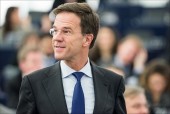The Netherlands has officially taken over, on January the 1st, the rotatory Presidency of the European Union at a crucial and difficult moment: when the 28 EU countries face not only a dramatic refugee crisis and they undergo an intense terrorism threat, but also challenged with the negotiations to assure the permanence of Britain in the Union and yet the fragile condition of the European economy highlighted by increasing unemployment.
Dutch Prime Minister Mark Rutte’s centre-right Liberals takes over now the rotatory presidency of the EU Council that will last the first semester of 2016, and obviously he is very aware of this this challenging environment.
The President of the European Commission (EC), Jean-Claude Juncker, at the last EU summit in December, stated that he is under “no illusions” about 2016; he stressed that “the present crisis and new ones will continue to come”. The Hague presides once more the EU, 12 years after it did for the last time, during the second half of 2004. Precisely at that moment it was decided to give the candidate status to Turkey, who now becomes the focus of the EU foreign policy because of the crucial role that Turkey is expected to play in order to regulate de flux of refugees entering the EU.
The EU is definitely going through turbulent times. Today the Netherlands stands close to Germany in those issues related with financial orthodoxy; but looks much closer to the United Kingdom in their desire to limit the growing legislative action of the EU only on essential matters. The Netherlands has already proved well its capacity of leadership, when presiding the Union in 1997, it led the crucial negotiations that resulted into the Treaty of Maastricht.
After the terrorist attacks in Paris, last November, and the endless flow of refugees, the EU is “to one of its most difficult tests” recently stated the Dutch Foreign Minister Mr. Bert Koenders, in a letter on the state of the Union addressed to the Dutch Parliament. “The EU cannot afford to shy away from this. The EU was founded on the fundamental values of freedom, democracy, the rule of law, equality and solidarity. People fleeing war or oppression should not be forced to put their lives in the hands of people smugglers” he said.
The migration crisis has, according to the Dutch government, revealed various shortcomings in the European area of freedom, security and justice that require action. “The crisis requires a common approach, to ensure the rapid elaboration and implementation of the European Commission’s package of proposals on migration. The first steps have been already taken, but we must follow up on them quickly” said Mr Koenders.
The EU risks the same fate as the Roman Empire, according to Dutch Prime Minister Mark Rutte, in an interview to the Financial Times. “As we all know from the Roman Empire; big empires go down if the borders are not well protected” said Rutte. “We really have an imperative that it is handled”.
At this moment, we should ask ourselves which are the fears we do really need to face in a new ‘Europe’. Considering the risks of closing the borders, Europe should look back at its history and to avoid the fear of silence, the fear in people’s eyes. There is a lot of work needed in this common area of freedom, security and justice.
Does the EU will facilitate this through a lighting path instead of closing the borders? Why does the EU obsessively reject the fact that migration can be a real force for development?
Paula Sendín
JESC


